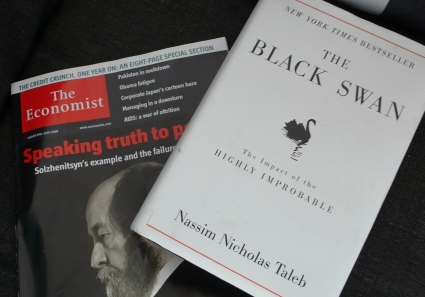Those and many other questions are pondered by Nassim Nicholas Taleb in his non fiction The Black Swan: The Impact of the Highly Improbable. However, there are far more important ideas and revelations in this book.

One of Talib's statements is that we just can't predict, or as he cites Yogi Berra "It is tough to make predictions, especially about the future". The book was published in Spring 2007 and it reads like the script of the credit crunch which emerged a year ago.
What is Talib's point? He tells us that most of our professional efforts are aimed at understanding and mastering phenomena that are explainable. But such efforts are positively useless, even quite dangerous, when that nutty outlier drops down for a landing - an outlier that can not be neglected like in a platonic Gaussian normal distribution.
So our risk manager geniuses have bet the farm — gazillions of farms — on models that have almost zero immunity to Black Swans, i.e. highly improbable impacts. There and their bosses' naïve and stupid overconfidence is a primary cause of their under-preparedness and the subsequent impact. But (again) a Black Swan has landed and they are burning my pension plan in the process.
According to Taleb, classical statistics only work in some domains like casinos in which the odds are visible and defined. His argument centres on the idea that predictive models are based on platonified forms and gravitate towards mathematical purity. Or in Talib' s words:
We love the tangible, the confirmation, the palpable, the real, the visible, the concrete, the known, the seen, the vivid, the visual, the social, the embedded, the emotional laden, the salient, the stereotypical, the moving, the theatrical, the romanced, the cosmetic, the official, the scholarly-sounding verbiage (b******t), the pompous Gaussian economist, the mathematicized crap, the pomp, the Academie Francaise, Harvard Business School, the Nobel Prize, dark business suits with white shirts and Ferragamo ties, the moving discourse, and the lurid. Most of all we favor the narrated.
Alas, we are not manufactured, in our current edition of the human race, to understand abstract matters — we need context. Randomness and uncertainty are abstractions. We respect what has happened, ignoring what could have happened. In other words, we are naturally shallow and superficial — and we do not know it. This is not a psychological problem; it comes from the main property of information. The dark side of the moon is harder to see; beaming light on it costs energy. In the same way, beaming light on the unseen is costly in both computational and mental effort.
Yes, Talib is sardonic and he loves to use the longsword, which makes this book about statistics and economics an even enjoyable read.
If you want to know more about the man, read the profile on Talin in the Sunday Times. At the end of the article are Talib's 10 top life tips. My favourite is number 4: Wear your best for your execution and stand dignified. Your last recourse against randomness is how you act — if you can’t control outcomes, you can control the elegance of your behaviour. You will always have the last word.. And I will definitely have to work on tip 2 & 8.
And Nassim, thank you for writing this book.

1 comment:
Confess it this became too highbrow for current state of the Mickle brain after your first 2 sentences....so
Have you seen any of the gymnastics? Hooray, women completing who are not stick figures, like me thay have sturdy thighs. And the male gymnasts, well I don't change channels when they come on.
When the brain comes back to highbrow I'll try Taleb. Yeah, will be after the Olymoics
Huggles, xxx
Post a Comment